Management Structure, Business Functions, and HR Talent Management
VerifiedAdded on 2023/06/06
|8
|1922
|61
Report
AI Summary
This project report provides an overview of management structures and essential business functions, highlighting their impact on organizational success. It delves into the advantages and disadvantages of various organizational structures, including line, matrix, and hybrid models, and examines core business functions such as strategy and finance. The report further explores crucial management functions like planning, organizing, staffing, directing, and controlling, emphasizing their roles in achieving organizational goals. Additionally, it discusses marketing functions and their relationship to business success, focusing on product development, pricing strategies, and product promotion. The role of HR in talent management, including recruiting, performance management, and career management, is also analyzed. Finally, the report underscores the importance of organizational culture in enhancing productivity and overall company performance. This report concludes that effective management is crucial for streamlining resources, optimizing business functions, and ultimately attaining organizational objectives, with HR and marketing playing integral roles.
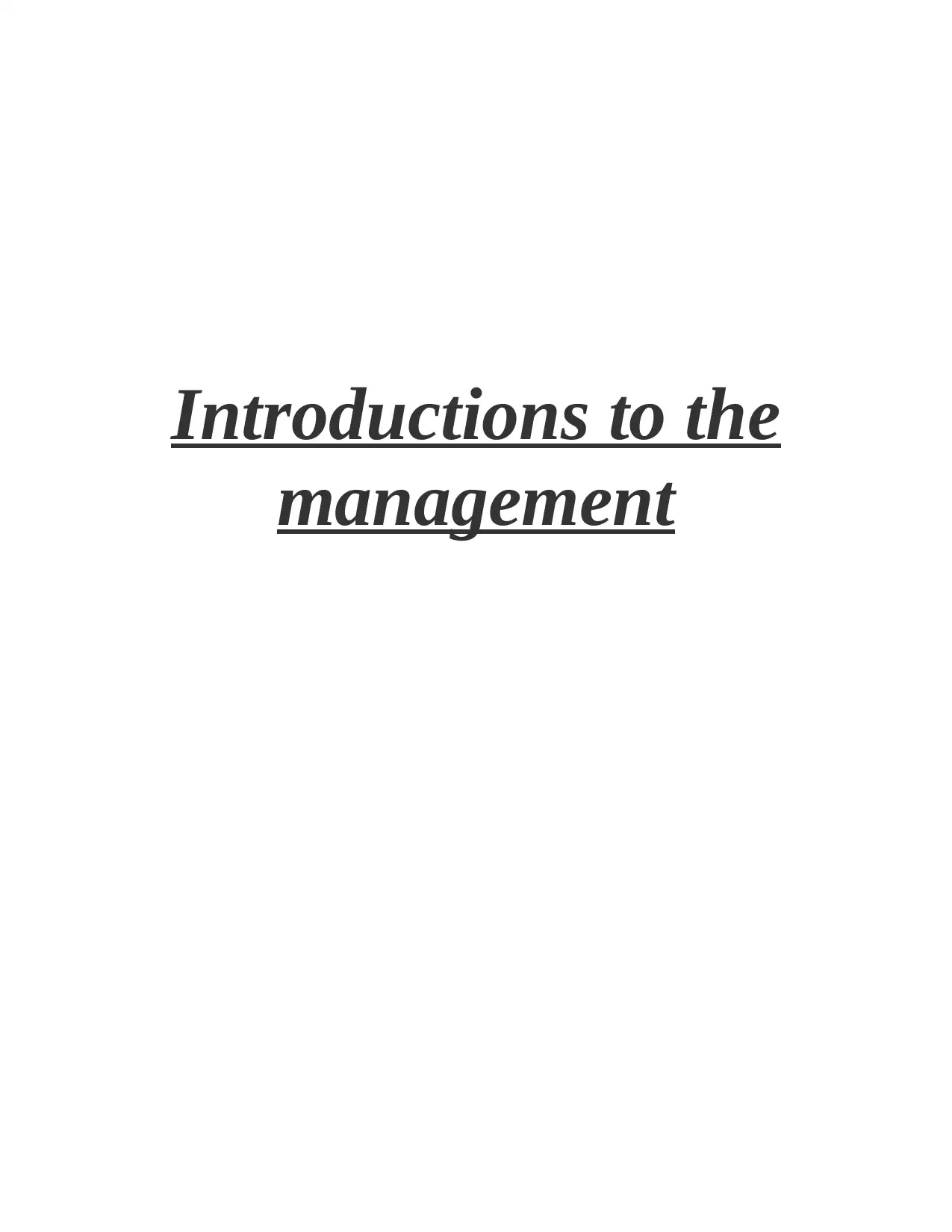
Introductions to the
management
management
Paraphrase This Document
Need a fresh take? Get an instant paraphrase of this document with our AI Paraphraser
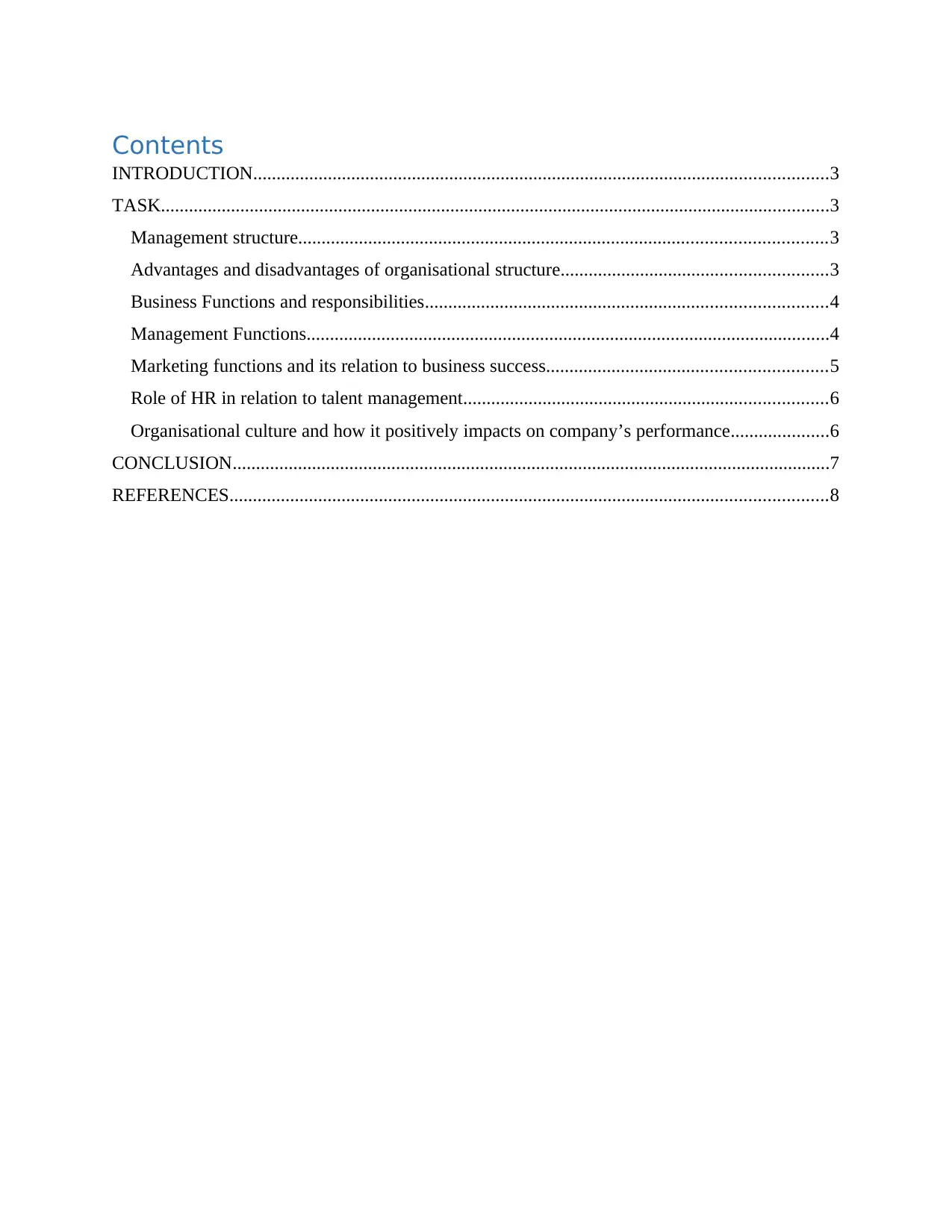
Contents
INTRODUCTION...........................................................................................................................3
TASK...............................................................................................................................................3
Management structure.................................................................................................................3
Advantages and disadvantages of organisational structure.........................................................3
Business Functions and responsibilities......................................................................................4
Management Functions................................................................................................................4
Marketing functions and its relation to business success............................................................5
Role of HR in relation to talent management..............................................................................6
Organisational culture and how it positively impacts on company’s performance.....................6
CONCLUSION................................................................................................................................7
REFERENCES................................................................................................................................8
INTRODUCTION...........................................................................................................................3
TASK...............................................................................................................................................3
Management structure.................................................................................................................3
Advantages and disadvantages of organisational structure.........................................................3
Business Functions and responsibilities......................................................................................4
Management Functions................................................................................................................4
Marketing functions and its relation to business success............................................................5
Role of HR in relation to talent management..............................................................................6
Organisational culture and how it positively impacts on company’s performance.....................6
CONCLUSION................................................................................................................................7
REFERENCES................................................................................................................................8
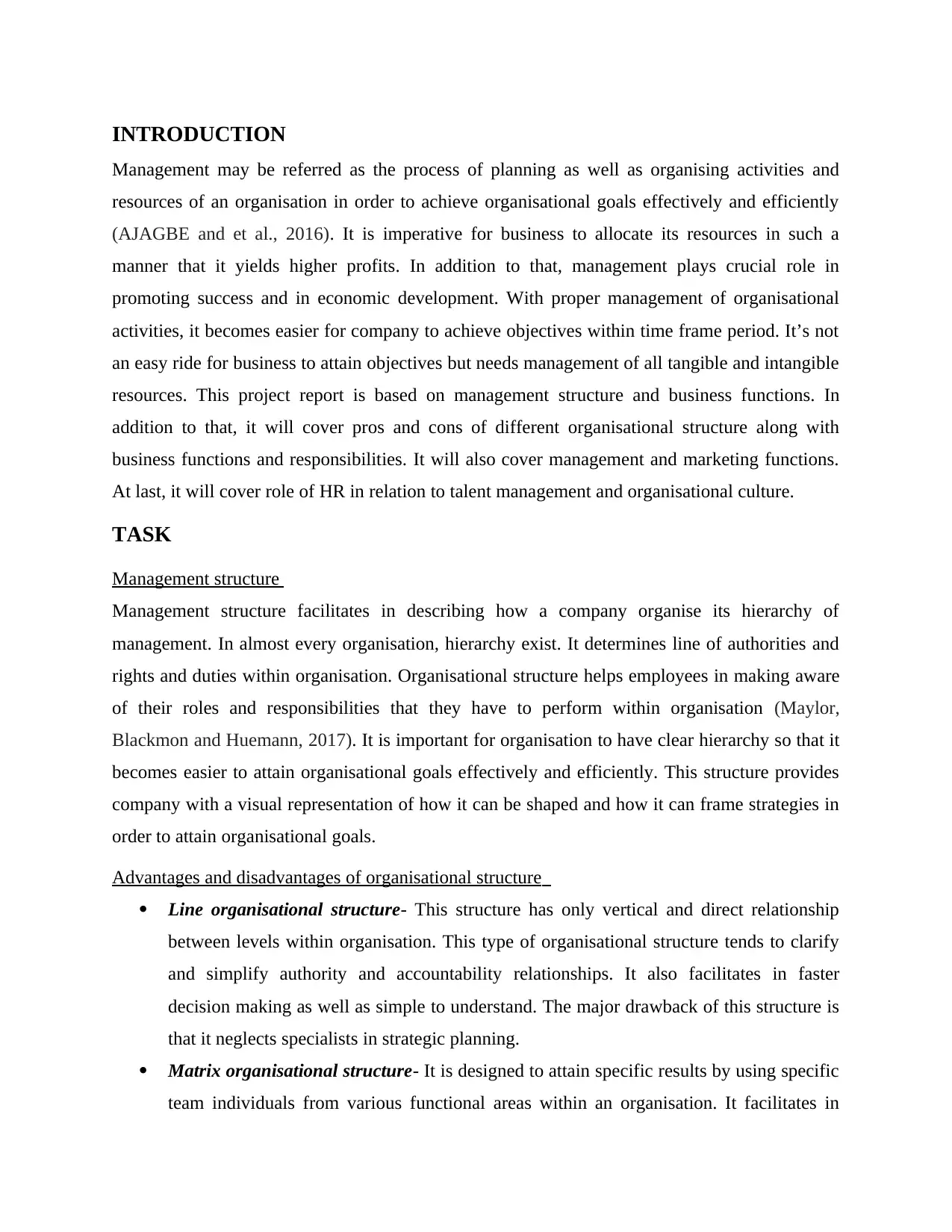
INTRODUCTION
Management may be referred as the process of planning as well as organising activities and
resources of an organisation in order to achieve organisational goals effectively and efficiently
(AJAGBE and et al., 2016). It is imperative for business to allocate its resources in such a
manner that it yields higher profits. In addition to that, management plays crucial role in
promoting success and in economic development. With proper management of organisational
activities, it becomes easier for company to achieve objectives within time frame period. It’s not
an easy ride for business to attain objectives but needs management of all tangible and intangible
resources. This project report is based on management structure and business functions. In
addition to that, it will cover pros and cons of different organisational structure along with
business functions and responsibilities. It will also cover management and marketing functions.
At last, it will cover role of HR in relation to talent management and organisational culture.
TASK
Management structure
Management structure facilitates in describing how a company organise its hierarchy of
management. In almost every organisation, hierarchy exist. It determines line of authorities and
rights and duties within organisation. Organisational structure helps employees in making aware
of their roles and responsibilities that they have to perform within organisation (Maylor,
Blackmon and Huemann, 2017). It is important for organisation to have clear hierarchy so that it
becomes easier to attain organisational goals effectively and efficiently. This structure provides
company with a visual representation of how it can be shaped and how it can frame strategies in
order to attain organisational goals.
Advantages and disadvantages of organisational structure
Line organisational structure- This structure has only vertical and direct relationship
between levels within organisation. This type of organisational structure tends to clarify
and simplify authority and accountability relationships. It also facilitates in faster
decision making as well as simple to understand. The major drawback of this structure is
that it neglects specialists in strategic planning.
Matrix organisational structure- It is designed to attain specific results by using specific
team individuals from various functional areas within an organisation. It facilitates in
Management may be referred as the process of planning as well as organising activities and
resources of an organisation in order to achieve organisational goals effectively and efficiently
(AJAGBE and et al., 2016). It is imperative for business to allocate its resources in such a
manner that it yields higher profits. In addition to that, management plays crucial role in
promoting success and in economic development. With proper management of organisational
activities, it becomes easier for company to achieve objectives within time frame period. It’s not
an easy ride for business to attain objectives but needs management of all tangible and intangible
resources. This project report is based on management structure and business functions. In
addition to that, it will cover pros and cons of different organisational structure along with
business functions and responsibilities. It will also cover management and marketing functions.
At last, it will cover role of HR in relation to talent management and organisational culture.
TASK
Management structure
Management structure facilitates in describing how a company organise its hierarchy of
management. In almost every organisation, hierarchy exist. It determines line of authorities and
rights and duties within organisation. Organisational structure helps employees in making aware
of their roles and responsibilities that they have to perform within organisation (Maylor,
Blackmon and Huemann, 2017). It is important for organisation to have clear hierarchy so that it
becomes easier to attain organisational goals effectively and efficiently. This structure provides
company with a visual representation of how it can be shaped and how it can frame strategies in
order to attain organisational goals.
Advantages and disadvantages of organisational structure
Line organisational structure- This structure has only vertical and direct relationship
between levels within organisation. This type of organisational structure tends to clarify
and simplify authority and accountability relationships. It also facilitates in faster
decision making as well as simple to understand. The major drawback of this structure is
that it neglects specialists in strategic planning.
Matrix organisational structure- It is designed to attain specific results by using specific
team individuals from various functional areas within an organisation. It facilitates in
⊘ This is a preview!⊘
Do you want full access?
Subscribe today to unlock all pages.

Trusted by 1+ million students worldwide
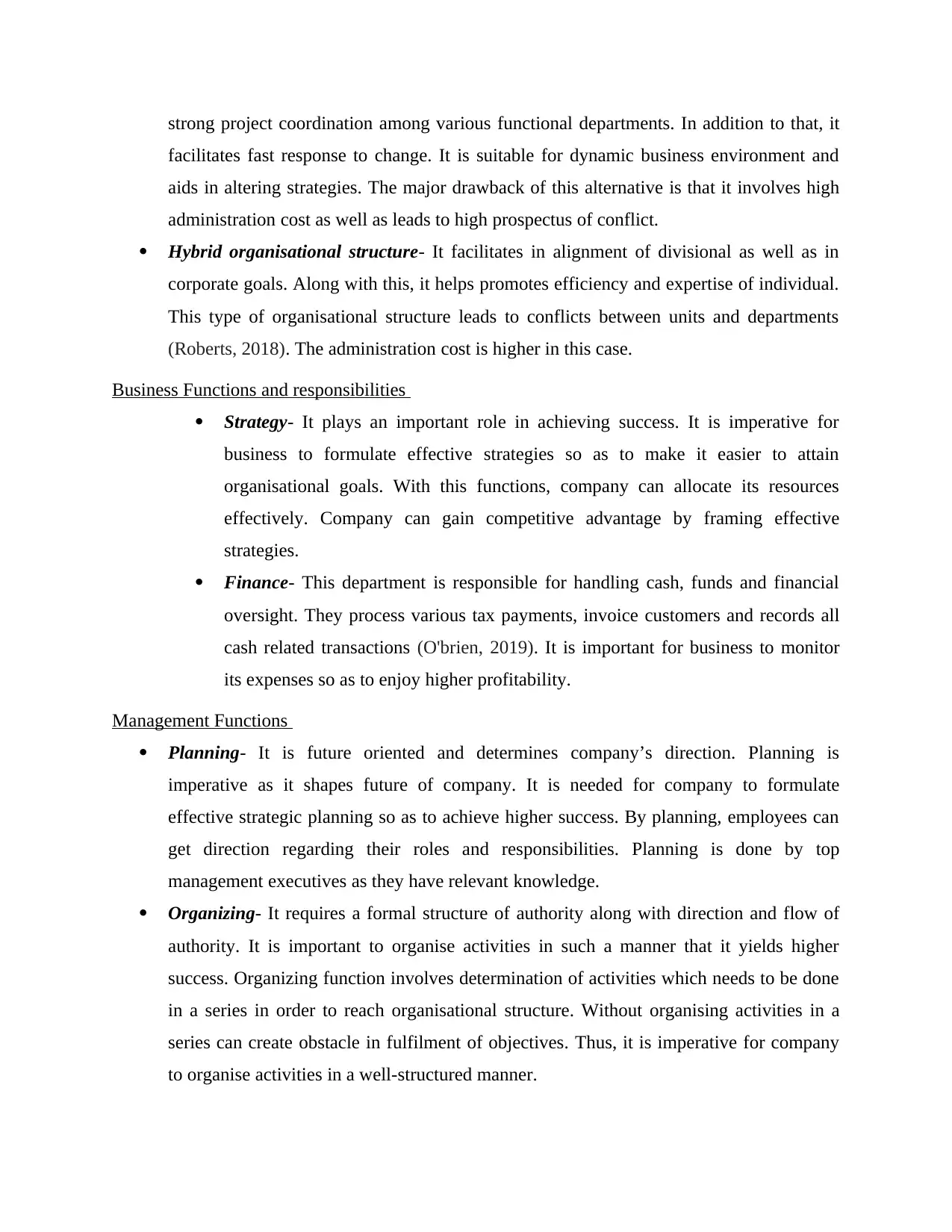
strong project coordination among various functional departments. In addition to that, it
facilitates fast response to change. It is suitable for dynamic business environment and
aids in altering strategies. The major drawback of this alternative is that it involves high
administration cost as well as leads to high prospectus of conflict.
Hybrid organisational structure- It facilitates in alignment of divisional as well as in
corporate goals. Along with this, it helps promotes efficiency and expertise of individual.
This type of organisational structure leads to conflicts between units and departments
(Roberts, 2018). The administration cost is higher in this case.
Business Functions and responsibilities
Strategy- It plays an important role in achieving success. It is imperative for
business to formulate effective strategies so as to make it easier to attain
organisational goals. With this functions, company can allocate its resources
effectively. Company can gain competitive advantage by framing effective
strategies.
Finance- This department is responsible for handling cash, funds and financial
oversight. They process various tax payments, invoice customers and records all
cash related transactions (O'brien, 2019). It is important for business to monitor
its expenses so as to enjoy higher profitability.
Management Functions
Planning- It is future oriented and determines company’s direction. Planning is
imperative as it shapes future of company. It is needed for company to formulate
effective strategic planning so as to achieve higher success. By planning, employees can
get direction regarding their roles and responsibilities. Planning is done by top
management executives as they have relevant knowledge.
Organizing- It requires a formal structure of authority along with direction and flow of
authority. It is important to organise activities in such a manner that it yields higher
success. Organizing function involves determination of activities which needs to be done
in a series in order to reach organisational structure. Without organising activities in a
series can create obstacle in fulfilment of objectives. Thus, it is imperative for company
to organise activities in a well-structured manner.
facilitates fast response to change. It is suitable for dynamic business environment and
aids in altering strategies. The major drawback of this alternative is that it involves high
administration cost as well as leads to high prospectus of conflict.
Hybrid organisational structure- It facilitates in alignment of divisional as well as in
corporate goals. Along with this, it helps promotes efficiency and expertise of individual.
This type of organisational structure leads to conflicts between units and departments
(Roberts, 2018). The administration cost is higher in this case.
Business Functions and responsibilities
Strategy- It plays an important role in achieving success. It is imperative for
business to formulate effective strategies so as to make it easier to attain
organisational goals. With this functions, company can allocate its resources
effectively. Company can gain competitive advantage by framing effective
strategies.
Finance- This department is responsible for handling cash, funds and financial
oversight. They process various tax payments, invoice customers and records all
cash related transactions (O'brien, 2019). It is important for business to monitor
its expenses so as to enjoy higher profitability.
Management Functions
Planning- It is future oriented and determines company’s direction. Planning is
imperative as it shapes future of company. It is needed for company to formulate
effective strategic planning so as to achieve higher success. By planning, employees can
get direction regarding their roles and responsibilities. Planning is done by top
management executives as they have relevant knowledge.
Organizing- It requires a formal structure of authority along with direction and flow of
authority. It is important to organise activities in such a manner that it yields higher
success. Organizing function involves determination of activities which needs to be done
in a series in order to reach organisational structure. Without organising activities in a
series can create obstacle in fulfilment of objectives. Thus, it is imperative for company
to organise activities in a well-structured manner.
Paraphrase This Document
Need a fresh take? Get an instant paraphrase of this document with our AI Paraphraser
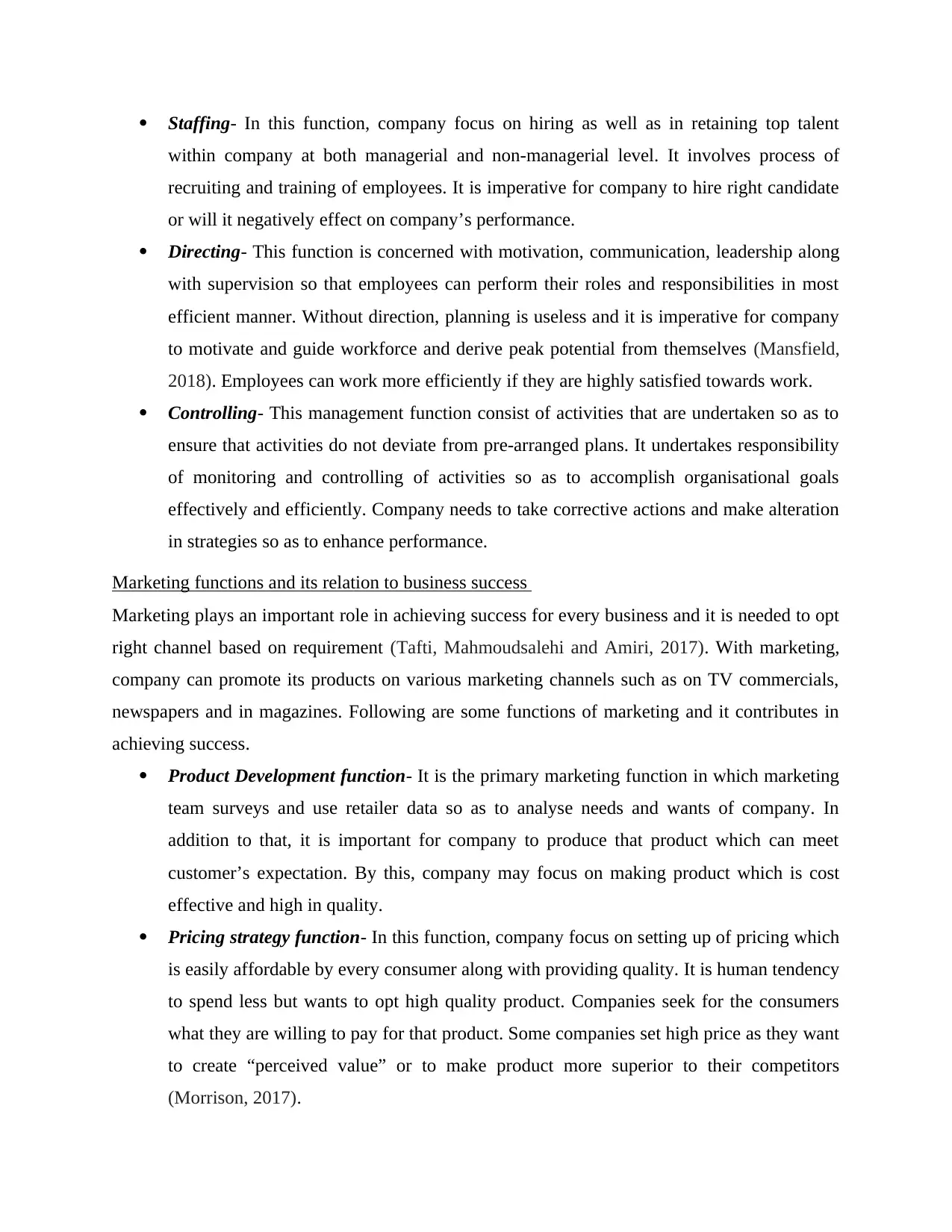
Staffing- In this function, company focus on hiring as well as in retaining top talent
within company at both managerial and non-managerial level. It involves process of
recruiting and training of employees. It is imperative for company to hire right candidate
or will it negatively effect on company’s performance.
Directing- This function is concerned with motivation, communication, leadership along
with supervision so that employees can perform their roles and responsibilities in most
efficient manner. Without direction, planning is useless and it is imperative for company
to motivate and guide workforce and derive peak potential from themselves (Mansfield,
2018). Employees can work more efficiently if they are highly satisfied towards work.
Controlling- This management function consist of activities that are undertaken so as to
ensure that activities do not deviate from pre-arranged plans. It undertakes responsibility
of monitoring and controlling of activities so as to accomplish organisational goals
effectively and efficiently. Company needs to take corrective actions and make alteration
in strategies so as to enhance performance.
Marketing functions and its relation to business success
Marketing plays an important role in achieving success for every business and it is needed to opt
right channel based on requirement (Tafti, Mahmoudsalehi and Amiri, 2017). With marketing,
company can promote its products on various marketing channels such as on TV commercials,
newspapers and in magazines. Following are some functions of marketing and it contributes in
achieving success.
Product Development function- It is the primary marketing function in which marketing
team surveys and use retailer data so as to analyse needs and wants of company. In
addition to that, it is important for company to produce that product which can meet
customer’s expectation. By this, company may focus on making product which is cost
effective and high in quality.
Pricing strategy function- In this function, company focus on setting up of pricing which
is easily affordable by every consumer along with providing quality. It is human tendency
to spend less but wants to opt high quality product. Companies seek for the consumers
what they are willing to pay for that product. Some companies set high price as they want
to create “perceived value” or to make product more superior to their competitors
(Morrison, 2017).
within company at both managerial and non-managerial level. It involves process of
recruiting and training of employees. It is imperative for company to hire right candidate
or will it negatively effect on company’s performance.
Directing- This function is concerned with motivation, communication, leadership along
with supervision so that employees can perform their roles and responsibilities in most
efficient manner. Without direction, planning is useless and it is imperative for company
to motivate and guide workforce and derive peak potential from themselves (Mansfield,
2018). Employees can work more efficiently if they are highly satisfied towards work.
Controlling- This management function consist of activities that are undertaken so as to
ensure that activities do not deviate from pre-arranged plans. It undertakes responsibility
of monitoring and controlling of activities so as to accomplish organisational goals
effectively and efficiently. Company needs to take corrective actions and make alteration
in strategies so as to enhance performance.
Marketing functions and its relation to business success
Marketing plays an important role in achieving success for every business and it is needed to opt
right channel based on requirement (Tafti, Mahmoudsalehi and Amiri, 2017). With marketing,
company can promote its products on various marketing channels such as on TV commercials,
newspapers and in magazines. Following are some functions of marketing and it contributes in
achieving success.
Product Development function- It is the primary marketing function in which marketing
team surveys and use retailer data so as to analyse needs and wants of company. In
addition to that, it is important for company to produce that product which can meet
customer’s expectation. By this, company may focus on making product which is cost
effective and high in quality.
Pricing strategy function- In this function, company focus on setting up of pricing which
is easily affordable by every consumer along with providing quality. It is human tendency
to spend less but wants to opt high quality product. Companies seek for the consumers
what they are willing to pay for that product. Some companies set high price as they want
to create “perceived value” or to make product more superior to their competitors
(Morrison, 2017).
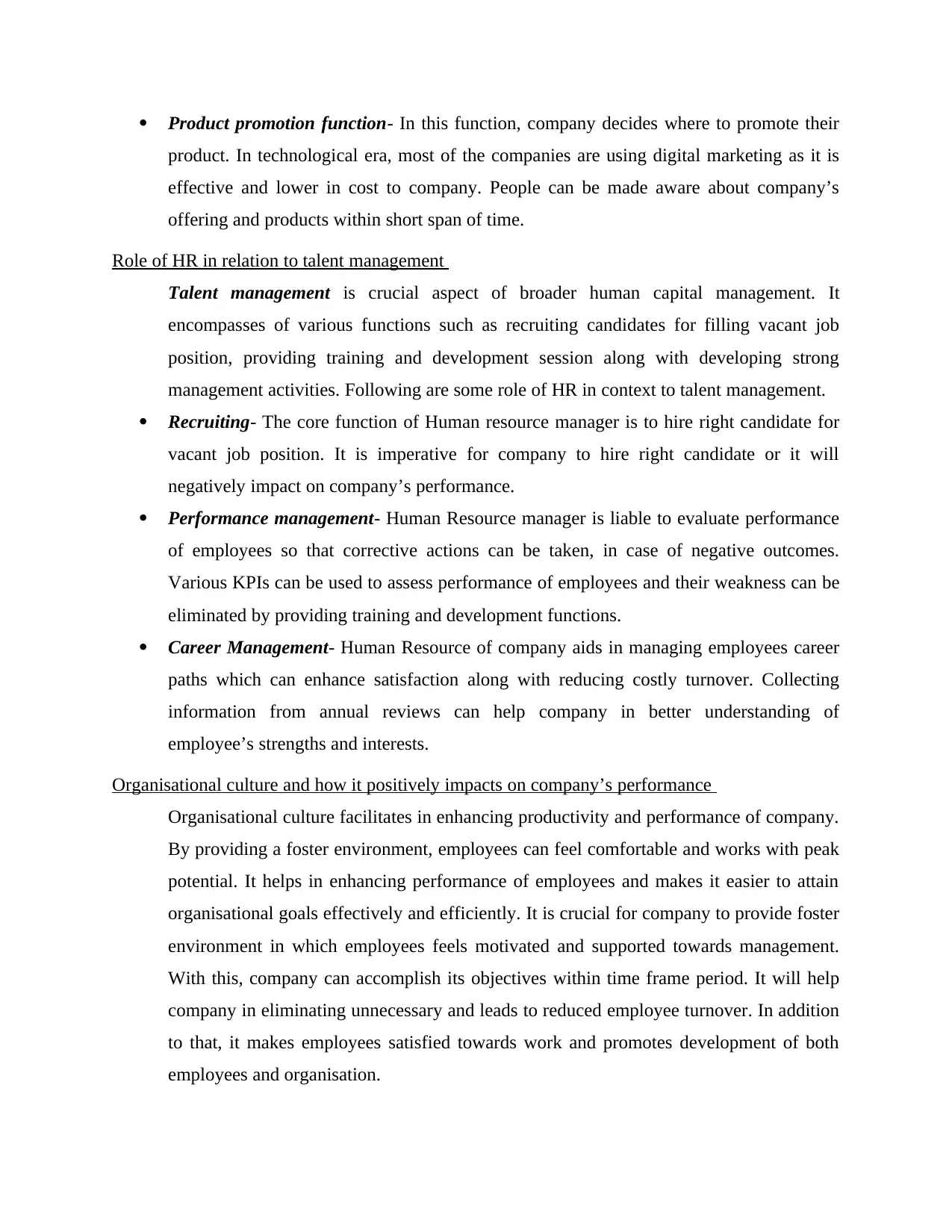
Product promotion function- In this function, company decides where to promote their
product. In technological era, most of the companies are using digital marketing as it is
effective and lower in cost to company. People can be made aware about company’s
offering and products within short span of time.
Role of HR in relation to talent management
Talent management is crucial aspect of broader human capital management. It
encompasses of various functions such as recruiting candidates for filling vacant job
position, providing training and development session along with developing strong
management activities. Following are some role of HR in context to talent management.
Recruiting- The core function of Human resource manager is to hire right candidate for
vacant job position. It is imperative for company to hire right candidate or it will
negatively impact on company’s performance.
Performance management- Human Resource manager is liable to evaluate performance
of employees so that corrective actions can be taken, in case of negative outcomes.
Various KPIs can be used to assess performance of employees and their weakness can be
eliminated by providing training and development functions.
Career Management- Human Resource of company aids in managing employees career
paths which can enhance satisfaction along with reducing costly turnover. Collecting
information from annual reviews can help company in better understanding of
employee’s strengths and interests.
Organisational culture and how it positively impacts on company’s performance
Organisational culture facilitates in enhancing productivity and performance of company.
By providing a foster environment, employees can feel comfortable and works with peak
potential. It helps in enhancing performance of employees and makes it easier to attain
organisational goals effectively and efficiently. It is crucial for company to provide foster
environment in which employees feels motivated and supported towards management.
With this, company can accomplish its objectives within time frame period. It will help
company in eliminating unnecessary and leads to reduced employee turnover. In addition
to that, it makes employees satisfied towards work and promotes development of both
employees and organisation.
product. In technological era, most of the companies are using digital marketing as it is
effective and lower in cost to company. People can be made aware about company’s
offering and products within short span of time.
Role of HR in relation to talent management
Talent management is crucial aspect of broader human capital management. It
encompasses of various functions such as recruiting candidates for filling vacant job
position, providing training and development session along with developing strong
management activities. Following are some role of HR in context to talent management.
Recruiting- The core function of Human resource manager is to hire right candidate for
vacant job position. It is imperative for company to hire right candidate or it will
negatively impact on company’s performance.
Performance management- Human Resource manager is liable to evaluate performance
of employees so that corrective actions can be taken, in case of negative outcomes.
Various KPIs can be used to assess performance of employees and their weakness can be
eliminated by providing training and development functions.
Career Management- Human Resource of company aids in managing employees career
paths which can enhance satisfaction along with reducing costly turnover. Collecting
information from annual reviews can help company in better understanding of
employee’s strengths and interests.
Organisational culture and how it positively impacts on company’s performance
Organisational culture facilitates in enhancing productivity and performance of company.
By providing a foster environment, employees can feel comfortable and works with peak
potential. It helps in enhancing performance of employees and makes it easier to attain
organisational goals effectively and efficiently. It is crucial for company to provide foster
environment in which employees feels motivated and supported towards management.
With this, company can accomplish its objectives within time frame period. It will help
company in eliminating unnecessary and leads to reduced employee turnover. In addition
to that, it makes employees satisfied towards work and promotes development of both
employees and organisation.
⊘ This is a preview!⊘
Do you want full access?
Subscribe today to unlock all pages.

Trusted by 1+ million students worldwide
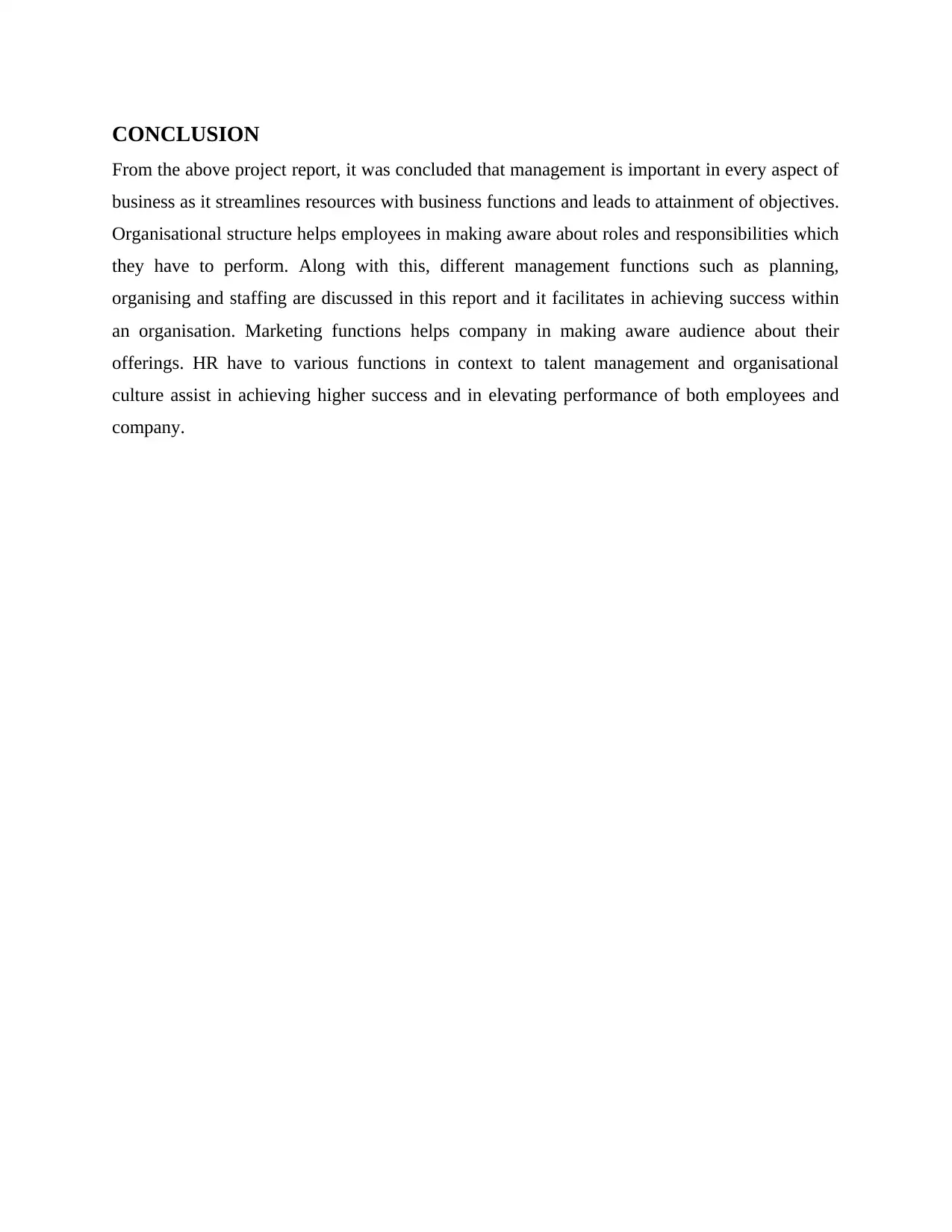
CONCLUSION
From the above project report, it was concluded that management is important in every aspect of
business as it streamlines resources with business functions and leads to attainment of objectives.
Organisational structure helps employees in making aware about roles and responsibilities which
they have to perform. Along with this, different management functions such as planning,
organising and staffing are discussed in this report and it facilitates in achieving success within
an organisation. Marketing functions helps company in making aware audience about their
offerings. HR have to various functions in context to talent management and organisational
culture assist in achieving higher success and in elevating performance of both employees and
company.
From the above project report, it was concluded that management is important in every aspect of
business as it streamlines resources with business functions and leads to attainment of objectives.
Organisational structure helps employees in making aware about roles and responsibilities which
they have to perform. Along with this, different management functions such as planning,
organising and staffing are discussed in this report and it facilitates in achieving success within
an organisation. Marketing functions helps company in making aware audience about their
offerings. HR have to various functions in context to talent management and organisational
culture assist in achieving higher success and in elevating performance of both employees and
company.
Paraphrase This Document
Need a fresh take? Get an instant paraphrase of this document with our AI Paraphraser
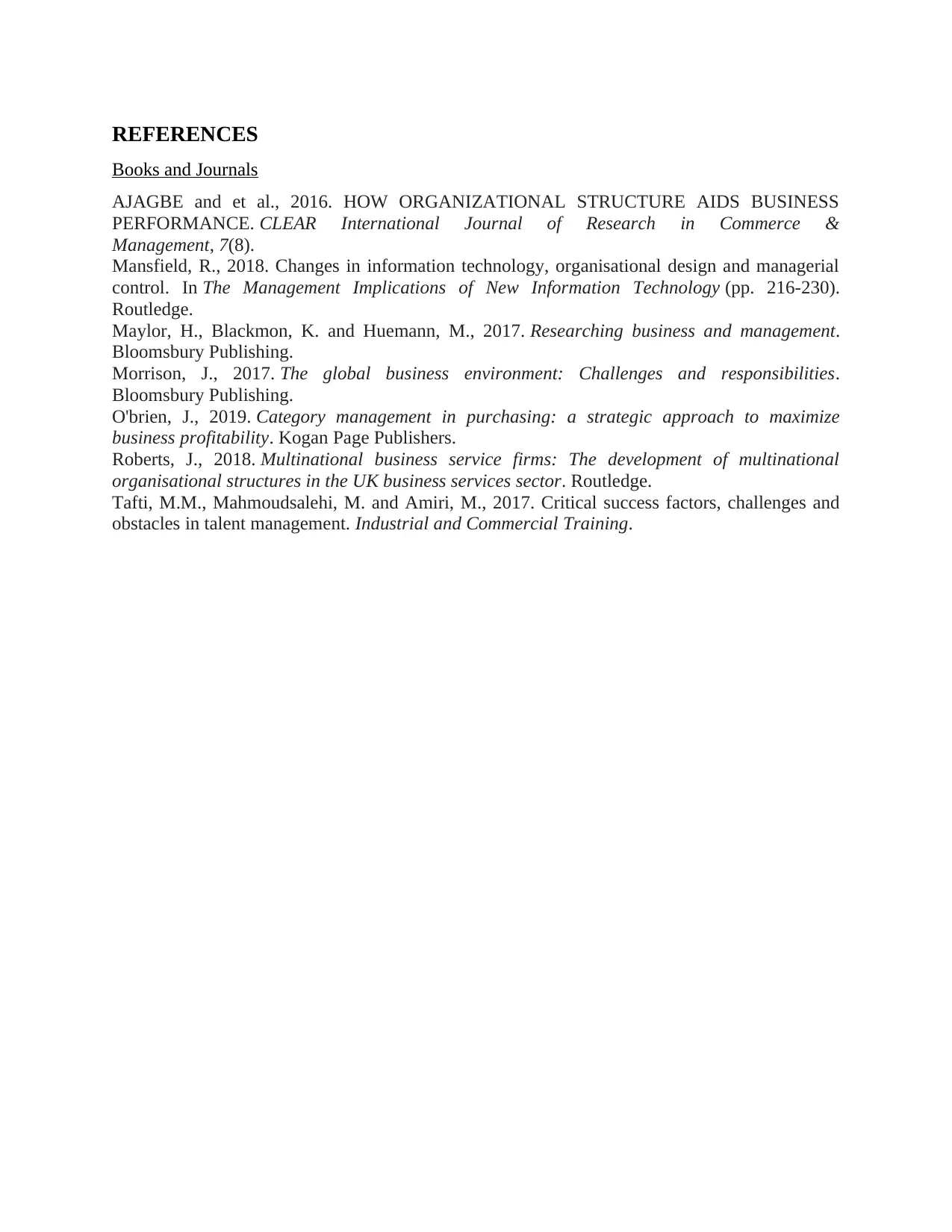
REFERENCES
Books and Journals
AJAGBE and et al., 2016. HOW ORGANIZATIONAL STRUCTURE AIDS BUSINESS
PERFORMANCE. CLEAR International Journal of Research in Commerce &
Management, 7(8).
Mansfield, R., 2018. Changes in information technology, organisational design and managerial
control. In The Management Implications of New Information Technology (pp. 216-230).
Routledge.
Maylor, H., Blackmon, K. and Huemann, M., 2017. Researching business and management.
Bloomsbury Publishing.
Morrison, J., 2017. The global business environment: Challenges and responsibilities.
Bloomsbury Publishing.
O'brien, J., 2019. Category management in purchasing: a strategic approach to maximize
business profitability. Kogan Page Publishers.
Roberts, J., 2018. Multinational business service firms: The development of multinational
organisational structures in the UK business services sector. Routledge.
Tafti, M.M., Mahmoudsalehi, M. and Amiri, M., 2017. Critical success factors, challenges and
obstacles in talent management. Industrial and Commercial Training.
Books and Journals
AJAGBE and et al., 2016. HOW ORGANIZATIONAL STRUCTURE AIDS BUSINESS
PERFORMANCE. CLEAR International Journal of Research in Commerce &
Management, 7(8).
Mansfield, R., 2018. Changes in information technology, organisational design and managerial
control. In The Management Implications of New Information Technology (pp. 216-230).
Routledge.
Maylor, H., Blackmon, K. and Huemann, M., 2017. Researching business and management.
Bloomsbury Publishing.
Morrison, J., 2017. The global business environment: Challenges and responsibilities.
Bloomsbury Publishing.
O'brien, J., 2019. Category management in purchasing: a strategic approach to maximize
business profitability. Kogan Page Publishers.
Roberts, J., 2018. Multinational business service firms: The development of multinational
organisational structures in the UK business services sector. Routledge.
Tafti, M.M., Mahmoudsalehi, M. and Amiri, M., 2017. Critical success factors, challenges and
obstacles in talent management. Industrial and Commercial Training.
1 out of 8
Related Documents
Your All-in-One AI-Powered Toolkit for Academic Success.
+13062052269
info@desklib.com
Available 24*7 on WhatsApp / Email
![[object Object]](/_next/static/media/star-bottom.7253800d.svg)
Unlock your academic potential
Copyright © 2020–2026 A2Z Services. All Rights Reserved. Developed and managed by ZUCOL.

